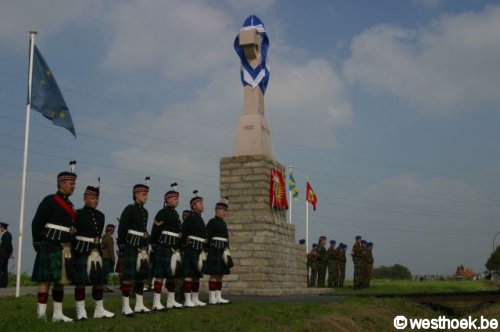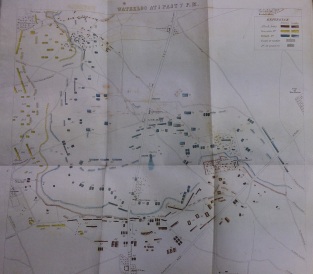Home » Posts tagged 'battle'
Tag Archives: battle
Planning begins for the Scots Commemoration of Passchendaele
Posted on behalf of University of Glasgow alumnus Tom Green

Dedication of Scottish Memorial, 2007
The Scottish Memorial in Flanders, Belgium was erected in August 2007 to commemorate the 90th anniversary of the Battle of Passchendaele. The monument is located close to the village of Zonnebeke and Ieper/Ypres, the town made famous by its location in the Ypres Salient where so much fighting took place during World War One. The monument is sited where the 15th (Scottish) Division stormed and captured ground held by the German army during the Battle of Passchendaele on 31 July 1917. The monument was unveiled in August 2007 during a high profile ceremony and plans are now in place to complete the Memorial Park as part of the commemoration of the centenary of the battle in August 2017. View images from the unveiling of the 2007 Memorial here and find out more about forthcoming commemorations through 2018 from the Passchendaele Memorial Museum website.
The University of Glasgow’s Waterloo
As we reflect upon the members of the University of Glasgow community who served in the First World War, it seems only appropriate to explore other conflicts. There is a long tradition of military service at the University of Glasgow. University staff raised funds to maintain militia to counter the Jacobite threats of 1708, 1715, and 1745; raised a Rifle Corps in 1859 and a number of staff, students, and graduates served in South Africa at the turn of the 20th century. The University’s Second World War Roll of Honour includes the names of 458 individuals who died in that conflict.
18 June 2015 marks the 200th anniversary of the Battle of Waterloo. For the bicentenary, we are taking the opportunity to look at the members of the University community who were at Waterloo and to highlight on-going research that is shedding new light on this momentous battle. See our Waterloo website for more information.
News of the victory reached London on 21st June and so from today until Sunday we will be commemorating the University of Glasgow’s connections to the famous victory over Napoleon’s forces in our #WaterloooWeekend twitter schedule.
Source Guide:
We have created a source guide summarising where you can find out about the University’s Waterloo links across our heritage collections including some Special Collections and Library Research Annexe volumes detailing models and tours of the Waterloo field, medals from the Hunterian Museum, and early student records from the Napoleonic period at the Archives.
View the source-guide here to help you with your Waterloo research!
Graduates:
Archives Graduate Trainee Alicia Chilcott and Great War Project Researcher Warwick Louth have been researching our medical alumni for those who served in Waterloo and we have so far identified 15 graduates who served as medics and surgeons at the battle. We are looking into 26 further Waterloo medics who may also have been medical students at the Univesity. We will be releasing the profiles of these graduates on our University Story website throughout the weekend and promoting on twitter so stay tuned to @GlasgowUniWW1 and @GUArchives to discover their stories.
Waterloo Uncovered:
In April 2015 initial survey work was done on the battlefield by Waterloo Uncovered, a ground-breaking archaeology project thought up by two soldiers from the Coldstream Guards, a regiment that played a vital role in the battle, and led by Dr Tony Pollard. The project brings together professional archaeologists from across Europe and wounded veterans from recent campaigns with the aims of transforming the understanding of the Battle of Waterloo through archaeology and providing a unique opportunity for veterans to participate in an important dig and support those that are injured in their recovery.
The team will be on site again in July, so watch the project website for updates and data – all findings will be made publicly available.
Conflict Archaeology & Heritage at the University of Glasgow:
To learn more about studying conflict archaeology at the University of Glasgow, see the MLitt in Conflict Archaeology & Heritage programme.
Stay tuned to our twitter accounts over 18th-21st June to uncover more Waterloo connections: @GlasgowUniWW1 , @GUArchives and @GUspcoll and look out for hashtags #Waterloo200, #waterlooweekend, and #battarch.
The Battle of Jutland
By Dr Jen Novotny, Research Assistant, Glasgow University’s Great War Project
Today we mark the 99th anniversary of the Battle of Jutland, the only full-scale naval battle of the First World War, which saw Admiral Jellicoe’s Grand Fleet meet the German High Seas Fleet in the North Sea on 31st May 1916. While the losses of ships were comparable, the Allied fleet suffered the greatest loss of personnel. The impact of the battle on the war has been debated by historians, but it is agreed that the battle failed to shift the balance of power and the Royal Navy remained dominant; the High Seas Fleet spent the rest of the war bottled up in the Baltic, unwilling to risk another costly engagement. Instead, Germany’s naval strategy for the North Sea and Atlantic concentrated on U-boat action.
Jutland: Glasgow’s Contribution
It is worth highlighting just some of the many connections between the battle and the West of Scotland: the Clydebuilt ships at Jutland that were the work of the men and women of the industrial sector, as well as looking at several individuals who fought in the battle. The First World War is so often spoken of in statistics – numbers that tend towards hyperbole and become meaningless. It is useful to personalise these numbers, contextualising the Battle of Jutland by evoking places with which we are familiar and learn about persons with whom we can identify.
Clydebuilt ships at Jutland
There were a number of Clydebuilt ships at the battle, including the Queen Elizabeth-class battleship HMS Barham, and battlecruisers HMS Tiger and HMS Inflexible built by John Brown Engineering at Clydebank. William Denny & Brothers of Dumbarton produced the destroyers HMS Petard, HMS Ardent, and the HMS Engadine, the seaplane carrier from which the first heavier-than-air reconnaissance flight during a naval battle was launched.
Scotts Shipbuilding and Engineering Company of Greenock produced the HMS Colossus, flagship of Rear-Admiral Ernest Gaunt, while Alexander Stephen & Sons in Govan built the destroyer HMS Nomad.


